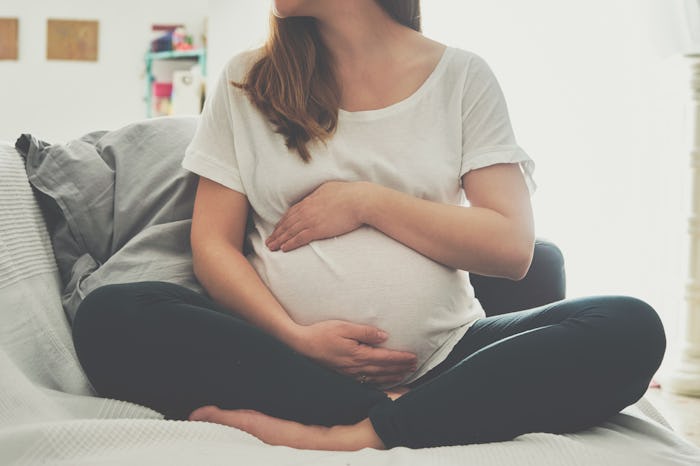Life
Eating Your Placenta Isn't Risky For Your Baby, New Study Finds, But It Might Not Help Either
When it comes to pregnancy, placentas deserve a lot of credit. They literally only exist to provide growing babies with things like oxygen and nutrients, and if all goes well, they then come right on out after delivery, as though helping sustain a human life was totally no big deal. Some women are firm believers, though, that consuming the placenta after birth is also majorly helpful, and though that belief has yet to be proven, a new study has at least found that eating your placenta after giving birth isn't risky for your newborn baby, according to KVAL News. So if the notion of knocking back a few placenta pills doesn't totally gross you out? You're probably OK to go for it. But, of course, be sure to check with your doctor beforehand.
Proponents of eating your own placenta — aka placentophagy — believe that placenta consumption can offer a boost to new moms, helping with things like milk production, and with lowering the risk of of postpartum depression, according to The New York Daily News. It also seems to be a growing trend among celebrity moms, with reality star Khloé Kardashian even announcing she planned to eat her placenta "in pills" after giving birth in a February episode of Keeping Up With The Kardashians.
The decision may not have been a hard one for the star though: her sisters, Kim and Kourtney, also ate their placentas, and have raved about the benefits of the experience. In 2015, Kim wrote in a blog post that she "felt so energized and didn't have any signs of depression" after giving birth — something she attributed to her freeze-dried placenta pills — while a year earlier, Kourtney shared a photo of her placenta pills on Instagram, calling them "life changing."
The Kardashian sisters — along with other placenta-eating celeb moms, like January Jones, Alicia Silverston, Mayim Bialik, Holly Madison, and Stacy Keibler — will likely be relieved by the findings of the latest study, which was conducted by researchers at at the University of Nevada, Las Vegas and Oregon State University, and is the largest of its kind to date, according to KVAL News. Acknowledging that placentophagy was becoming an "increasingly popular practice," researchers studied 23,000 birth records to gather data on how many women were actually eating their placentas, why they were doing it, and whether it affected neonatal outcomes. The results, published recently in Birth, were pretty reassuring.
Of the birth records studied, just under one third of mothers (31.2 percent) consumed their placenta, the majority of whom did so by taking freeze-dried placenta in capsule form. Women who had home births were more likely than other women to actually eat their placentas, according to the study, as were those who had suffered from pre-pregnancy depression or anxiety — a fact the researchers attributed to the belief that placentophagy can help with PPD.
That may or may not actually be the case — the study noted that "no evidence currently exists to support this strategy," while according to Science, two other recent studies into the practice of placentophagy found women who ate their placentas had "no significant changes in their moods, energy levels, hormone levels, or in bonding with their new infant" than moms who took a placebo. But the value in the newest study specifically is that it seems to suggest that placentophagy is at least a safe practice. And that's a particularly important detail, given that the Centers for Disease Control had actually released a report in June 2017 advising against the practice.
The reason behind the CDC's decision? According to the report, a newborn in Oregon had actually contracted a group B Streptococcus agalactiae (GBS) infection after birth that was eventually linked to the mother's placenta pill consumption. Yet according to Oregon State University, the CDC report was "based on a single case study," which, in light of the new study's results, seems like an important distinction. Conversely, as lead study author Daniel Benyshek, a professor of anthropology at UNLV, noted, the OSU/UNLV study's findings actually provide "little reason to caution against human maternal placentophagy out of fear of health risks to the baby.”
In other words, placenta pills might not help, but as this study suggests, they also probably won't hurt. What is valuable to note, though, is that placentophagy is far from being the only option new mothers have for treating PPD. Unlike placenta pills, psychotherapy and antidepressant medication have both been proven to be effective, as well as a variety of lifestyle changes, according to the Mayo Clinic. So while there may not be any danger to giving placenta pills a shot, it's still definitely important to consult with your doctor if you are worried about PPD, or if you're experiencing any symptoms.
Check out Romper's new video series, Bearing The Motherload, where disagreeing parents from different sides of an issue sit down with a mediator and talk about how to support (and not judge) each other’s parenting perspectives. New episodes air Mondays on Facebook.
